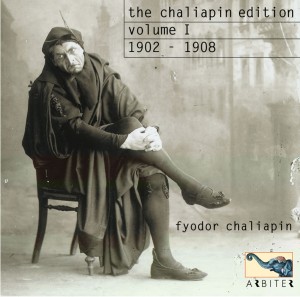Track List
Mussorgsky's Song of the Flea, recorded in 1907, was orchestrated by Stravinsky, one of his earliest works and the first known recording of his music.
- Koenemann When The King Went To War
- Slonim Ah, Thou Red Sun
- Korganov Elegy
- Gounod Faust: Act 2: Le Veau D'or
- Tchaikovsky The Nightingale, Op.60/4
- Folk song: Nochenka
- Glinka A Life For The Tsar: Act 4: My Dawn Will Come
- Tchaikovsky Disenchantment, Op.64/2
- Manukin-Nevstruev Song Of The Needy Pilgrim
- Koenemann When The King Went To War
- Boito Mefistofele: Prologue: Ave Signor
- Gounod Faust: Act 4. Serenade
- Mussorgsky-Stravinsky The Song Of The Flea
- Gounod Faust: Act 2: Le Veau D'or
- Folk song: Eh, Vanka
- Folk song: Nochenka
- Folk song: Luchinushka
- Glinka Ruslan & Ludmila: Act 2. Farlaf's Rondo
- Rossini Barbiere Di Siviglia: Act 1: La Calunnia
- Glinka A Life For The Tsar: Act 4: They Guess The Truth; My Dawn Will Come
- Delibes Lakme: Act 2: Lakme, Ton Doux Regard
- Glinka Ruslan & Ludmila: Act 2: From The Dark Shroud Of Eternity
- Folk song: Dubinushka
- Folk song: Arise, Fair Sun
The Chaliapin Edition, Volume 1: 1902-1908
With this first volume, Arbiter initiates The Chaliapin Edition, based on the most complete private collection of Chaliapin’s recordings extant, that of the late Vladimir Gurvich and graciously made available by Mrs. Vladimir Gurvich. His complete published recordings and many unissued discs are presented here in chronological sequence following the Discography of Feodor Ivanovich Chaliapin, compiled by Alan Kelly and Vladimir Gurvich. The texts to all his recordings are drawn from Gurvich’s manuscript, F. I .Chaliapin – Recorded Legacy. As Chaliapin himself emphasized the importance of the words by including them in his song recital booklets, the complete texts are given here with facing translations. Rather than offer extensive biographical notes, we wish to encourage all listeners to read his two remarkable autobiographies and the biography written in collaboration with Maxim Gorky, For a singer, Chaliapin’s recording life had an unimaginable span of almost forty years. Feodor Ivanovich Chaliapin (Shalyapin) was born on February 13 (February 1 old style) 1873 in the ancient and picturesque city of Kazan, where he spent most of his childhood. Both parents were of the peasant origin, though his father never did farm work, but rather, having learned Russian grammar, served as a minor clerk. As he earned little money and, in addition, drank heavily, the family lived in need.
Four grades of the parochial school were the only years of Chaliapin’s formal education. He was apprenticed to a shoemaker, then to a carpenter, and for a few kopecks also helped his father to copy documents in the office. At age nine, Chaliapin began singing in a church choir and one year later took part in a performance by a provincial theater. He was so deeply moved by this experience that could no longer think about anything else. At age seventeen, Chaliapin left home and started traveling with theater companies. With one such troupe, he came to the town of Ufa [South Ural Mountains] where he debuted in the chorus of A Singer from Palermo, a comic opera by the Austrian composer Alfred Zamara. This day, September 26, 1890, marked the beginning of almost half-a-century of Chaliapin’s singing career.
The first roles for the young singer were: Mephistopheles, Ruslan (Ruslan and Ludmila), Zuniga, Count Robinson (Il Matrimonio Segreto), Panas (Christmas Eve), Vereisky (Dubrovsky), The Bailiff (Werther), Svat [Matchmaker] and Miller (Rusalka), Prince Galitsky (Prince Igor), and Prince Vladimir (Rogneda).
By the age of 26 (1899), Chaliapin unequivocally had became the foremost Russian opera singer. Cylinders exist from this decade, some of which will appear on the final volume in this series. Demand for his performances soon increased, new roles were learned, and an international career developed. These first discs offer a unique glimpse of the artist still in formation yet already at a remarkable artistic level.
-Joseph Darsky

